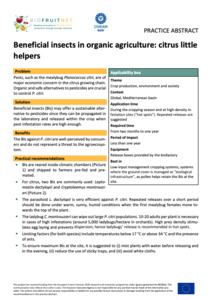{Tool} Beneficial insects in organic agriculture: citrus little helpers. Creator(s): Avosani, Sabina and Verrastro, Vincenzo. Issuing Organisation(s): CIHEAM Bari - Mediterranean Agronomic Institute of Bari. Biofruitnet practice abstracts, no. 1. (2022)
|
PDF
- Published Version
- English
(Beneficial insects in organic agriculture: citrus little helpers)
361kB | |
![[thumbnail of BioFruitNet Citrus.png]](/43468/3.hassmallThumbnailVersion/BioFruitNet%20Citrus.png)  Preview |
Image (PNG)
- Cover Image
- English
129kB |
Document available online at: https://orgprints.org/43468
Summary in the original language of the document
The BIs against P. citri are well-perceived by consumers and do not represent a threat to the agroecosystem.
Practical recommendations
• BIs are reared inside climatic chambers and shipped to farmers pre-fed and pre-mated.
• For citrus, two BIs are commonly used: Leptomastix dactylopii and Cryptolaemus montrouzieri.
• The parasitoid L. dactylopii is very efficient against P. citri. Repeated releases over a short period should be done under warm, sunny, humid conditions when the first mealybug females move towards the top of the plant.
• The ladybug C. montrouzieri can wipe out large P. citri populations. 10-20 adults per plant is neces-sary in cases of high infestations (around 5,000 ladybugs/hectare in orchards). High prey density stimulates egg laying and prevents dispersion; hence ladybugs’ release is recommended in hot spots.
• Limiting factors (for both species) include temperatures below 17 °C or above 34 °C and the presence of ants.
• To ensure maximum BIs at the site, it is suggested to (i) mist plants with water before releasing and in the evening, (ii) reduce the use of sticky traps, and (iii) avoid white cloths.
| EPrint Type: | Practice tool |
|---|---|
| What problem does the tool address?: | Pests, such as the mealybug Planococcus citri, are of major economic concern in the citrus growing chain. Organic and safe alternatives to pesticides are crucial to control P. citri. |
| What solution does the tool offer?: | Beneficial insects (BIs) may offer a sustainable alternative to pesticides since they can be propagated in the laboratory and released within the crop when pest infestation rates are high enough. |
| Country: | Italy |
| Type of Practice Tool: | Practice abstracts |
| Keywords: | Crop production, citrus, biodiversity, biological control |
| Agrovoc keywords: | Language Value URI English crop production http://aims.fao.org/aos/agrovoc/c_5976 English Citrus http://aims.fao.org/aos/agrovoc/c_1637 English biodiversity http://aims.fao.org/aos/agrovoc/c_33949 English biological control http://aims.fao.org/aos/agrovoc/c_918 |
| Subjects: | Environmental aspects > Biodiversity and ecosystem services Crop husbandry > Production systems > Fruit and berries |
| Research affiliation: | European Union > Horizon 2020 > Biofruitnet Italy > IAMB Mediterranean Agronomic Institute Bari European Union > Organic Farm Knowledge |
| Horizon Europe or H2020 Grant Agreement Number: | 862850 |
| Related Links: | https://organic-farmknowledge.org/tool/43468, https://www.facebook.com/organicfarmknowledge/posts/435596651686308, https://twitter.com/farm_knowledge/status/1493139061393006596 |
| Project ID: | ofk |
| Deposited By: | Basler, Andreas |
| ID Code: | 43468 |
| Deposited On: | 01 Feb 2022 13:06 |
| Last Modified: | 02 May 2024 10:31 |
| Document Language: | English |
| Status: | Published |
Repository Staff Only: item control page

 Download Statistics
Download Statistics Download Statistics
Download Statistics
